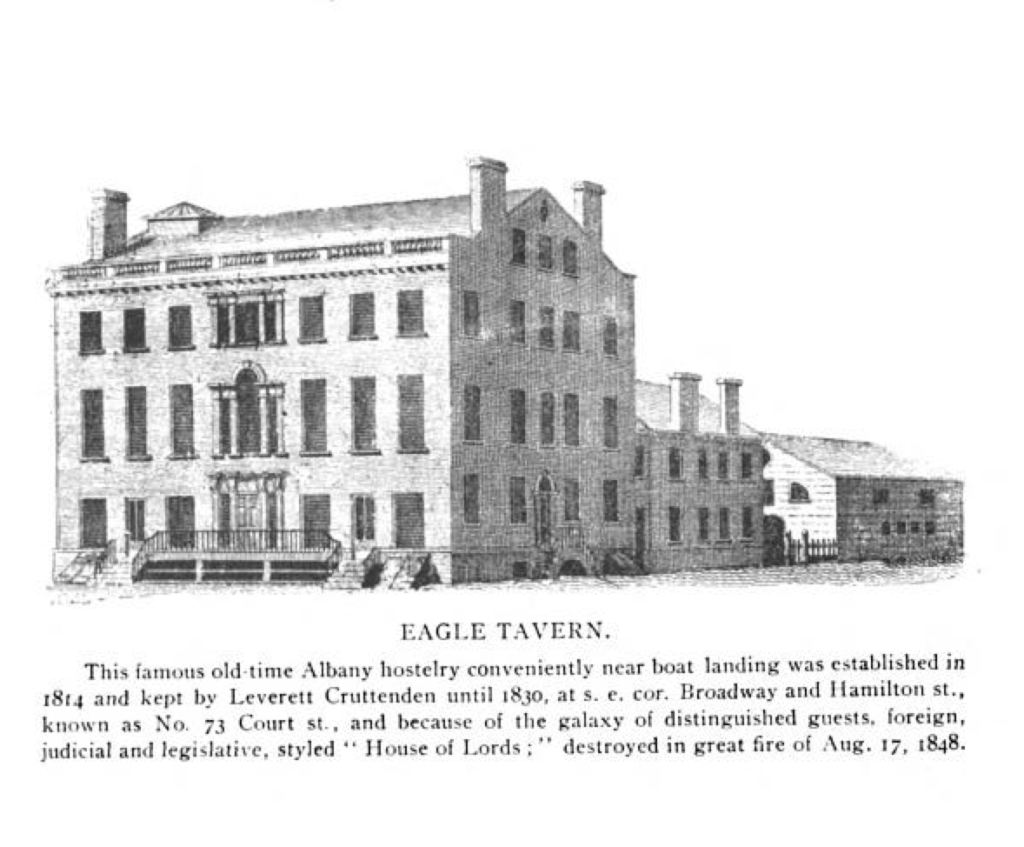
Yesterday we showed a handbill from the Eagle Tavern, sometime after 1845, promising that it had been regenerated to what it had once been. Turns out it had once been quite the place indeed. Cuyler Reynolds’s “Albany Chronicles” listed any number of notable events that had taken place at the Eagle. It said that the tavern was established in 1814 and kept by Leverett Cruttenden until 1830, but that it was destroyed in the “great fire” of August 17, 1848.
Despite dating the Eagle Tavern to 1814, Reynolds reported that it hosted Commodore Perry in 1813:
“Nov. 8. Citizens and all the local military commands go to Schenectady to meet Commodore Oliver Hazard Perry, styled the ‘Hero of Lake Erie’ by reason of his complete victory there over the British fleet on Sept. 10th, who was on his way to his native city, South Kingston, R.I. (b. Aug. 23, 1785) being but 28 years old at the time. He is met at Douw’s Tavern on the turnpike, and after partaking of refreshments there the procession proceeds to the Capitol, where he is presented with an elegant sword and the freedom of the city encased in a gold box, after which ceremony the procession escorts him to the Eagle Tavern, n.e. [sic] corner of Broadway and Hamilton street, where the Mayor and Record escort him to a specially prepared suits of rooms. At night he attends a grand ball and notes the illuminated transparency over his hotel, ‘We have met the enemy and they are ours.’” An elaborate entertainment was given in his honor at the Eagle Tavern on Nov. 9, and he departed for Rhode Island on the 11th.”
On March 3, 1818, “Freshet so high that water stood over 2 feet deep in the barroom of the Eagle Tavern, s.e. corner So. Market (Broadway) and Hamilton streets, the ferry carried half way to Pearl street and sailing vessels floated over the dock, one family carried in its house across the river to Bath.”
On August 15, 1822, “Joseph Bonaparte, Spain’s ex-King, arrives at Albany on his travels, and takes rooms at Eagle Tavern, s.e. cor. Broadway and Hamilton.”
On Nov. 14, 1833, “Henry Clay, great American statesman, arrives and is escorted to the Eagle Tavern, s.e. cor. Broadway and Hamilton st., where he is addressed by the Mayor on behalf of the city, by Ambrose Spencer for the older men and John B. Van Schaick for young men.”
On Feb. 4, 1835, there was a meeting at the tavern “to discuss bridging the river.” (Just 30 years later it would be a reality!)
On July 20, 1835, the Eagle Tavern, “made famous by Landlord Leverett Cruttenden, taken over by H.H. Crane of Rochester.” When Cruttenden died in Connecticut in 1838, it was noted that he was long the landlord of Congress Hall, and subsequently of the Eagle Tavern. “His establishment known as the House of Lords because of the prominent characters stopping there, was started in 1814, and conducted by him with great éclat for sixteen years.” His successor Hector Crane died that same year, at only 44 years of age.
In August 1839, Henry Clay returned to the Eagle Tavern, “arriving by way of Troy in a barouche, accompanied by John Townsend, Daniel D. Barnard and John Bay, and when nearing the city joined by a large procession, Gen. Towsend, marshal, to act as escort.” Clay steamboated off to New York two days later.
On August 17, 1848, the Eagle Tavern appears to have met its end. “‘The Great Fire’ started by a washerwoman’s bonnet at the Albion Hotel, corner of Broadway and Herkimer street, the flames spreading to the north by a strong south wind, sweeping both sides of Broadway and Church street, and crossing the water to the Pier, devastating everything to Maiden Lane and along Broadway to Hudson avenue; but at night lessened by heavy rainfall; 600 buildings burned, including the Eagle Tavern on Broadway; loss $3,000,000; burnt area 37 acres; greatest width being 700 feet west from the river on Herkimer st., and greatest length on one street being 1,600 feet along Quay st.”

Leave a Reply